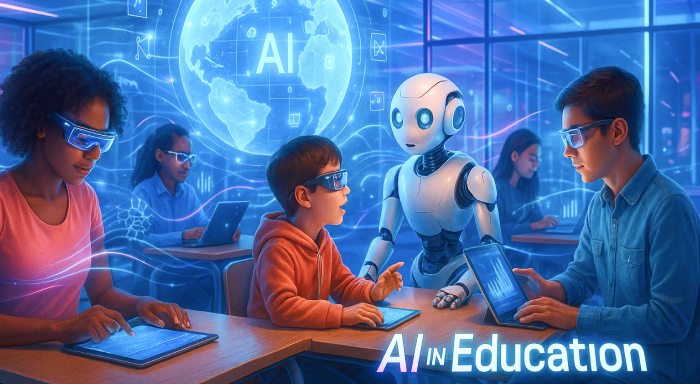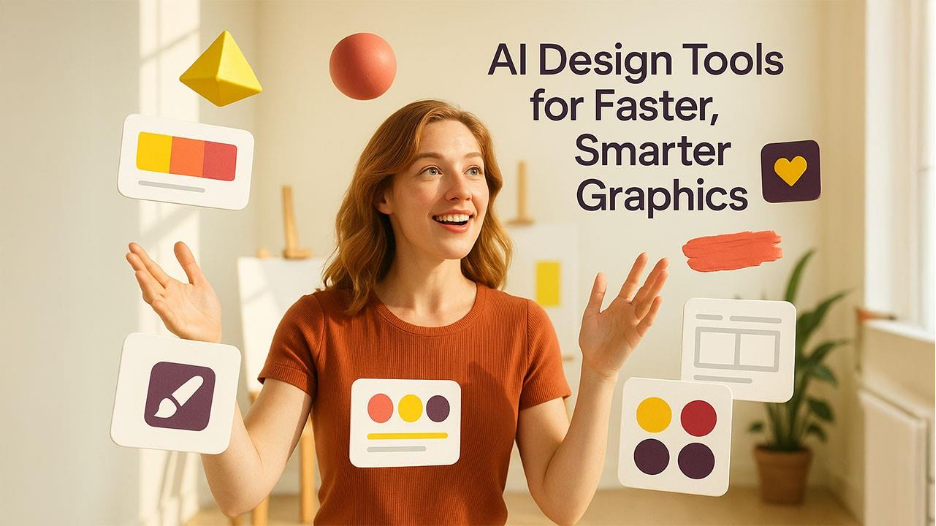The world is experiencing the AI revolution, and its transformative role is evident in the education industry as well. Educational and academic institutions across the globe are embracing the AI
The world is experiencing the AI revolution, and its transformative role is evident in the education industry as well. Educational and academic institutions across the globe are embracing the AI technology. This has redefined the educational approach, creating new opportunities for cognitive learning. AI has addressed many longstanding limitations in the education industry, turning aspirations into possibility. In this blog, we have explored the importance of AI in education industry, with key benefits and implementation.
AI in education involves the implementation of machine learning algorithms, natural language processing, and data analytics for educational operations. It facilitates personalised learning, real-time grading, and administrative efficiency. AI enables a more immersive experience for the students in their educational journey. It acts as a supportive assistant to the educators so that they can simplify the teaching process, making it fun and engaging.
Role of AI in Education
With the availability of innumerable AI tools such as Polybuzz AI in the market that offer specific functionalities, AI has simplified the different educational processes. It has influenced almost every aspect of the modern education system. Let us understand the importance of AI in education and how it optimises the learning process.
AI-driven Personalised Learning
Due to the lack of convenience, traditional educational methods had a one-size-fits-all approach. The ease that AI has brought with itself has redefined the educational techniques, making personalised learning experiences a possibility. Many time-taking tasks can now be performed quickly, saving time and efforts, which can be invested in building a customised strategy more suitable for individual growth. AI-driven analysis of a student’s behaviour, strengths, and weaknesses can be used to personalise the teaching methods.
Key benefits:
- Personalised lesson plans based on the comprehensive level of the student.
- Flexible curriculum that can align with the students’ progress speed.
- Multiple learning styles with audios, videos, and infographics that can support the versatile needs of different learners.
- Innovative teaching methods to accommodate students with special needs.
Evaluation and Feedback Automations
Evaluation techniques have been improvised with AI. AI-driven grading automations provide real-time analysis on students’ works. These insights can be used to personalise the teaching methods with a focus on the problematic sections of individuals. With natural language processing (NLP) abilities, AI can perform faster evaluations of large volumes of student submissions, examination papers, and other assignments.
Key benefits:
- Instant Feedback – Faster responses enable students to better incorporate the feedback into their working styles.
- Fair Assessments – Consistent and fair evaluations without human bias can be conducted using AI.
- In-depth Analysis – Can be used to identify the specific segments that require improvement.
- Time efficiency and Scalability – AI can process large volumes of assessments in a short period of time.
Elevated Student Engagement and Support
Traditional teaching methods rarely involve student interactions with learning through books and study materials. Integration of AI into the smart educational systems can provide an immersive learning experience that students enjoy and take interest in. AI tools can be utilised to generate videographic demonstrations designed to explain complex processes that are difficult to visualise. Easily accessible AI-powered virtual assistants and chatbots enable students to gain instant responses to any query that they might have.
Key benefits:
- Interactive learning – Enhances the learning experience and encourages student engagement.
- Improved understanding – Students get a better understanding of different concepts.
- Task Support – Easily available AI tools can assist students with different tasks.
Accessibility and Inclusion
Traditional education systems have a narrow approach that does not support inclusivity. AI integration facilitates inclusive learning environments that can cater to the special needs of differently abled students. With AI, education can be simplified and made more accessible to students that cannot travel or live in remote areas.
Key benefits:
- Specialised tools – Provide specific functionalities that address the limitations of different disabilities.
- Multilingual support – For the convenience of international students.
- Regulation Compliance – Enables compliance with accessibility standards prevalent in many regions, especially in Europe and North America.
Administrative Efficiency
AI-powered automations and CRM systems can be adopted to optimise the administrative tasks and streamline the operations. They provide efficiency in student data maintenance, schedule planning, resource allocation, and facility management. Admissions and documentation processes can also be simplified with AI implementation.
Key benefits:
- Automated scheduling – Reduces conflicts and improves resource utilisation.
- Student selection and enrolment – Processing and screening of large number of student applications.
- Performance analytics – Valuable insights for strategic decision-making.
AI Implementation in the Education Industry
Below are a few implementation methods that highlight the importance of AI in education and learning.
1. Virtual Assistants and Chatbots
Students can take the help of AI-powered virtual assistants and chat interfaces like ChatGPT, Gemini, Janitor AI, and more to gain information about any required topic. Higher education students can utilise AI to assist with their projects and research work. Many large universities are adopting virtual teaching assistants and chatbots to handle repetitive queries, provide 24/7 academic support, and reduce response time.
2. Content Generation
Educators can leverage AI to generate content in different formats, enabling them to design interactive learning materials such as:
- Text: Creating notes, learning guides, summaries, Q&A, etc. Writing tools such as, Claude Sonnet 4 can assist with this.
- Images and Infographics: Diagrams, flowcharts, graphs, and more can be designed using tools like Getimg, DALL-E, Canva, etc.
- Videos: Demonstrative videos and tutorials can be produced with tools like Sora and Google Veo, then refined with AI video summarizer.
3. Examination
Different applications of AI in the examination segment are:
- AI tools like Blooket AI generate question sets, saving time and efforts.
- Automations can be implemented for identity verification.
- During online examinations, AI-powered tools can analyse the facial movements and behaviours to identify malpractices and ensure integrity.
4. Language Learning
Nowadays, many language learning platforms integrate AI to personalise the learning process and support pronunciation and conversational learning. The real-time feedback based on voice recognition and NLP abilities improves accuracy. For instance, Duolingo offers customisation through AI.
5. Accessibility Tools
Functionalities that help differently abled students include:
- Transcription tools to transcribe lectures for assistance to students with hearing impairments.
- AI-driven text-to-speech conversions for visually impaired students.
Google’s Gemini: The Next Step for AI in Education
Recently at Google I/O 2025, new features for Gemini (Google’s advanced AI model) were launched. One of them was the ability to generate interactive quizzes. This feature was designed with the objective of enhancing student engagement and providing a personalised learning experience. It enables students to create practice quizzes to assist with their studies. Gemini will then provide real-time feedback based on the answers, with emphasis on topics that need improvement. Further, it will automatically generate a new quiz based on the previous evaluation.
Students across the globe can access this feature for free through Gemini on mobile and desktop. Additionally, Google is offering free Gemini upgrades for a year to students pursuing higher studies in the US, Brazil, Indonesia, Japan, and the UK.
Conclusion
AI has redefined the education industry, empowering both educators and learners. Personalised learning, administrative efficiency, and convenient accessibility are few of the benefits that AI has to offer. Academic institutions across the globe have realised the importance of AI in education. While developed countries such as the USA, Canada, and many European nations with advanced technology-mediated learning and educational infrastructure showcase faster rates of AI adoption, developing countries have also begun to integrate AI in their educational strategy.
AI solutions address the evolving needs of the education industry, providing enhanced learning experience to students all over the world.
Respond to this article with emojis






